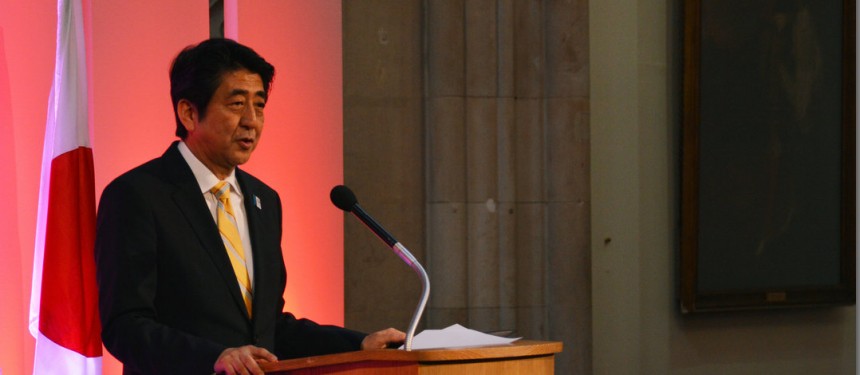The number of international students studying at higher education level in Japan has declined for the third year running, though foreign student numbers are up in language institutions, new data from the Japan Student Services Organisation (JASSO) has revealed.
News and business analysis for Professionals in International Education
Have some pie!
International students down in Japan’s HE for third year running
 Japan's Prime Minister Abe aims to increase the number of international students in Japan to 300,000 by 2020. Photo: Chatham House.
Japan's Prime Minister Abe aims to increase the number of international students in Japan to 300,000 by 2020. Photo: Chatham House. These figures highlight the challenge faced by Prime Minister Abe to fulfil his commitment to double international student numbers to 300,000 by 2020
The annual survey showed that there were 135,519 international students enrolled at higher education institutions in Japan as of May 2013 (the Japanese academic year typically begins in February or March) – down by 1.6% on 2012.
The continued decrease, though slight, contributed to a drop of around 4.5% since 2010. In contrast, international student numbers rose by 6.8% between 2009 and 2010.
The vast majority of international students at Japanese higher education and language institutions – almost 93% – were from Asia. China remained the primary source country by a significant margin, followed by Korea, though numbers did decrease compared to the previous year, by 5.1% and 8.1% respectively.
However, there was a 43.8% increase in the number of students hailing from Vietnam, to 6,290, and a 30.1% increase in Nepalese students, to 3,188.
Japanese universities could still be seeing the effects of international students leaving in the aftermath of the 2011 Tohoku Earthquake, Tatsu Hoshino, Executive Secretary of the Japan Association of Overseas Studies (JAOS) and CEO of Rising Star study abroad consultancy, told The PIE News.
Given that 60% of international students in higher education have progressed through Japanese language institutions, it is possible that Japan is seeing a “time lag” as students who decided not to return to Japan to continue their studies do not progress to university as expected, he said.
“It is thought that growth in international student numbers will return to previous figures when the effects of the earthquake have faded” as students progress through the school system to plug the gap, he explained.
This is backed up by figures showing that the number of students at Japanese language institutions increased by a third since 2012 to 36,626. The number of short-term foreign students – those studying in Japan for a year or less and not for a degree – also showed a slight increase.
However, these figures highlight the challenge faced by Prime Minister Abe to fulfil his commitment to double international student numbers to 300,000 by 2020.
Earlier this year, the Ministry of Education, Culture, Science and Technology (MEXT) reiterated its commitment to this goal with its National University Reform Plan, which laid out plans to support universities with internationalisation through “inviting educational-units from foreign universities, establishing joint graduate schools, actively employing foreign faculty, [and] increasing courses carried out in English.”
However, Hoshino argued that the government “continues to be preoccupied with palliative policies” and must increase its efforts to market Japanese education abroad and make foreign students more aware of support available.
“Looking at the current situation, I think it’s becoming extremely challenging [to meet this goal],” he said.
He added that both the government and education institutions should make more use of agencies in recruiting students from abroad.
Still looking? Find by category:



7 Responses to International students down in Japan’s HE for third year running